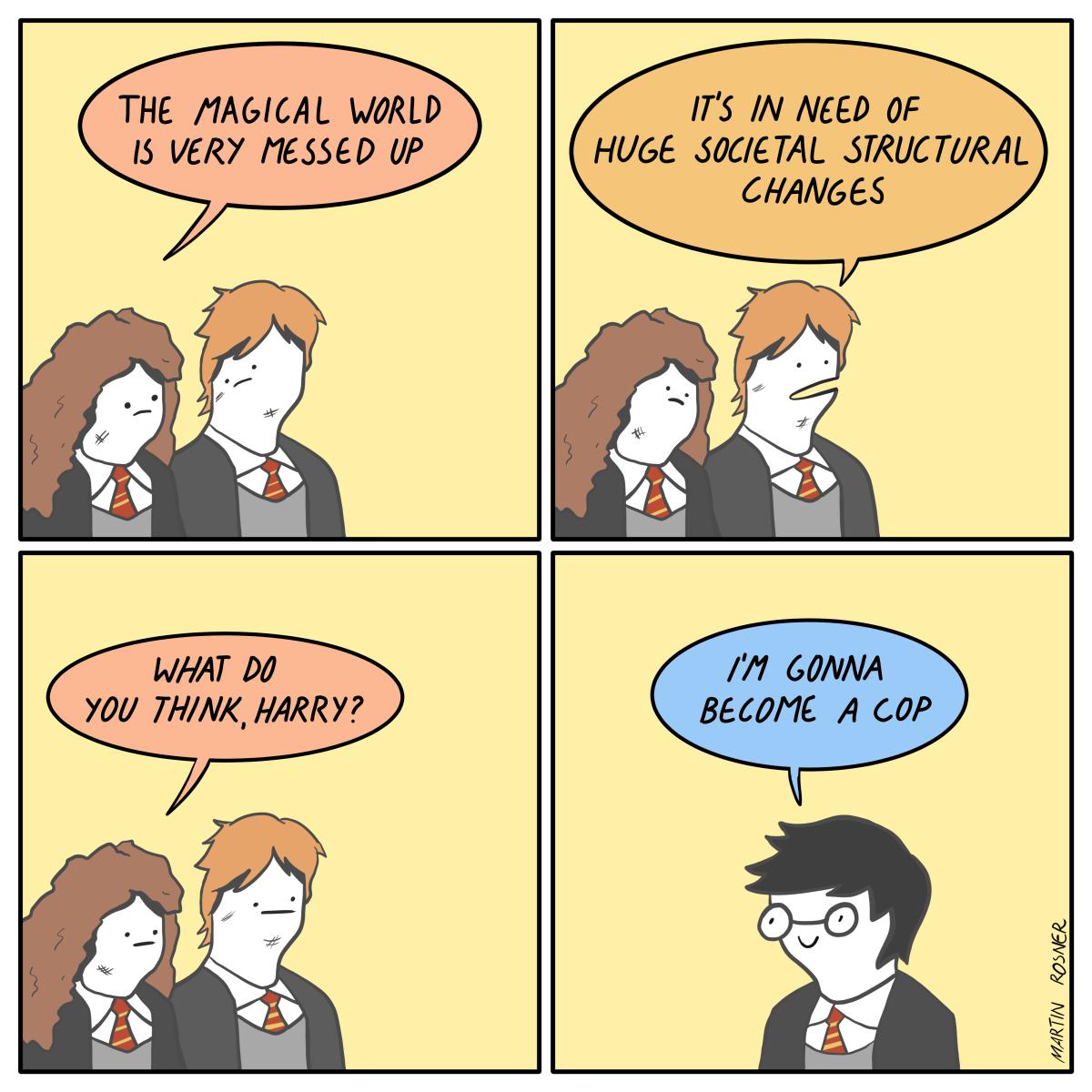this post was submitted on 04 Feb 2024
1361 points (96.9% liked)
Comic Strips
12594 readers
3249 users here now
Comic Strips is a community for those who love comic stories.
The rules are simple:
- The post can be a single image, an image gallery, or a link to a specific comic hosted on another site (the author's website, for instance).
- The comic must be a complete story.
- If it is an external link, it must be to a specific story, not to the root of the site.
- You may post comics from others or your own.
- If you are posting a comic of your own, a maximum of one per week is allowed (I know, your comics are great, but this rule helps avoid spam).
- The comic can be in any language, but if it's not in English, OP must include an English translation in the post's 'body' field (note: you don't need to select a specific language when posting a comic).
- Politeness.
- Adult content is not allowed. This community aims to be fun for people of all ages.
Web of links
- [email protected]: "I use Arch btw"
- [email protected]: memes (you don't say!)
founded 1 year ago
MODERATORS
you are viewing a single comment's thread
view the rest of the comments
view the rest of the comments

That's like saying "Dumbledore had the biggest assault rifle of anyone, so he can do anything".
Sure he was a powerful duelist, but a group of others could take him down.
So, setting the "power" aside, he has 2 choices:
Operate within the system and bureaucracy to effect change via normal political motion
Use non combat magic to manipulate others, (time travel, invisibility, foresight) effectively hoping to be a benevolent authoritarian
If he goes with 1, he has to maintain favor. You can see how tenuous that is, with his favor slipping during the unrest. The parents wouldn't take their kids out of Hogwarts long term, they'd kick.dumbledore out instead.
For the most part it's feasible that he could have made more direct changes to the school, yes. Good point.
Except it's not, not even close. Having a gun is not the same as having authority and influence in an institution or government. He ran Hogwarts, for one thing, as you said. He could have very easily refused to have house elves at the school unless they were paid employees, and that alone would have made a very public statement, which would have meant a lot on a societal level coming from such an important, influential, public figure. There are other options for labour, so it's not like he had any excuse not to. He also had political influence and could have pushed for changes in legislation if he wanted. Part of why the ministry was so afraid of him was because of the influence he had. It wasn't because he was a string wizard and they thought he would come to the ministry one day and shoot up the place if he didn't get his way, Dumbledore could only do so much against an entire building full of powerful wizards, even he wouldn't be able to stand up to all of the ministry's aurors. He had friends, connections, a reputation, a history, control over one of the most influential schools in the world which produced a significant percentage of the world's licenced and trained Wizarding population, direct access to thousands of witches and wizards who could all potentially be the next minister of magic or the next Voldemort or hell the next Dumbledore. He absolutely could have leveraged that to change something societally but he only ever used it to maintain his own status quo when the ministry got too jumpy and tried to knock him down a few pegs.
You say that like it would be difficult. He was beloved by most of his students, many of which had influential parents or would become influential themselves. He had an untold number of connections from favours he'd provided over the years, people he'd helped, or even just friends in high places. He was close with many high ranking experts in their respective field including his professors and others outside of Hogwarts. He'd previously been the one to take down the first wizard Hitler, and had been instrumental in fighting the second wizard Hitler. Etc, etc. His favour only slipped with the ministry precisely because they were aware of the power he held politically and were afraid of him leveraging that, and thought his claims of Voldemort returning were part of a move to take over the ministry. That was the entire deal behind the Dumbledore's army conspiracy. Even when they managed to force him out of Hogwarts they had to basically play dirty and strong arm him out of the position because they knew they couldn't do it through any legitimate channels. Even then the school constantly pushed back against them taking over and it became a nightmare to deal with.
But it's not like he would have to stage a revolution to enact meaningful change. All he'd have to do is suggest a change in legislation to important figures who respected his opinion, openly advocate for said legislation to gain public support, y'know, regular everyday activism and political lobbying, and he'd undoubtedly get results.
I'm not gonna read all that you hardly formatted it.
First sentence refers to having a gun, and yeah , the person I replied to mentioned him being a powerful wizard. That's all I commented on there.
Further in my comment I discuss politics, choices, and influence.
Oh no two whole paragraphs longer than 3 sentences. I didn't mean to frighten you with words.
I already made my point and I don't care about.your fanfic